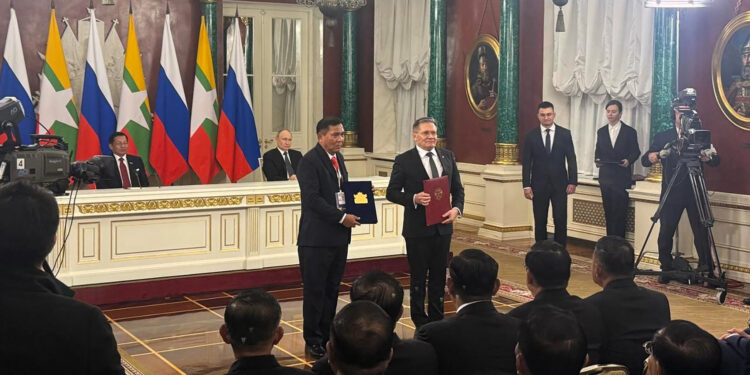Russia’s State Atomic Energy Corporation (Rosatom) is pressing on with its plan to build a nuclear power plant in Naypyitaw, despite the partial destruction of the city during the March 28 earthquake.
“The recent earthquake has not affected Rosatom’s plans in Myanmar,” the company’s press office said in an email.
“Rosatom adheres to the highest international safety and reliability standards, including strict seismic resistance requirements,” Rosatom was quoted as saying by Reuters on Tuesday.
Junta chief Min Aung Hlaing finalized the deal for Myanmar’s first nuclear reactor in a meeting with President Vladimir Putin in March, during his first official visit to Russia. The deal came three years after a memo of understanding to study the feasibility of a small modular reactor in Myanmar was signed at the 2022 Atom Expo in the Russian resort city of Sochi.
On March 5, the junta boss told the Russia-Myanmar Business Forum that Moscow would help build a nuclear power plant with capacity of 110 megawatts.
The public has been told nothing about the project, including its location or time frame.
However, Rosatom Director General Alexey Likhachev told a Russian news agency that the reactor would be built near Naypyitaw.
The 7.7-magnitude earthquake rocked central Myanmar three weeks after Min Aung Hlaing returned from Moscow, claiming more than 3,700 lives. Naypyitaw suffered the highest death toll after Mandalay.
The quake also left a trail of destruction across the administrative capital, damaging the presidential residence, parliament, military and government buildings, hotels, staff housing and infrastructure. Some ministries are planning to relocate operations to Yangon.
On April 18, Min Aung Hlaing announced soil would be tested as part of plans to reconstruct buildings in less earthquake-prone areas on Naypyitaw.
However, locals living in fear after the March 28 earthquake are voicing alarm over the risk of a nuclear disaster from a reactor built in a seismic zone.
Meanwhile, pledges by Moscow and the junta that the nuclear power generated will only be used for peaceful purposes have been met with skepticism, given the regime’s ongoing air and artillery bombardment of resistance-held areas. Junta forces also continued their attacks in the aftermath of Cyclone Mocha in 2023 and widespread floods and mudslides in 2024. Over 100 people have been killed in junta airstrikes sine the March 28 quake.
The regime has lost control of large swaths of territory across ethnic states and central Myanmar, fueling fears that the fulfilment of a nuclear dream pursued since the era of former dictator Than Shwe could be exploited for military gain.

















